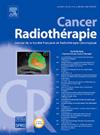低分割放疗在直肠肿瘤治疗中的应用
IF 1.4
4区 医学
Q4 ONCOLOGY
引用次数: 0
摘要
本综述旨在探讨低分割放疗在直肠肿瘤治疗中的放射生物学原理和临床证据,特别是在新辅助治疗策略和器官保存方法方面。本文综述了低分割放疗(也称为短程放疗)的关键随机对照试验。临床试验已经证明,在总生存期和局部复发方面,低分割放疗和标准的长疗程放化疗在肿瘤学上是等效的,但对于体弱或老年患者,短疗程放疗是一种相关的治疗选择。在全新辅助治疗方面,短期放疗联合巩固化疗改善了远处控制,但可能增加局部复发的风险。最近的研究表明,在经过精心挑选的患者中,短期放疗可导致器官保存,然后进行经肛门手术或主动监测,并且与免疫检查点抑制剂联合使用可以安全地增加完全缓解率。它在全新辅助治疗、免疫联合治疗和器官保存策略中的应用需要仔细的患者选择和进一步的比较试验来完善其适应症。本文章由计算机程序翻译,如有差异,请以英文原文为准。
Hypofractionated radiotherapy in the management of rectal tumours
This review aims to explore the radiobiological rationale and clinical evidence supporting the use of hypofractionated radiotherapy in the management of rectal tumours, particularly in neoadjuvant treatment strategies and organ preservation approaches. An overview of key randomized controlled trials on hypofractionated radiotherapy, also called short-course radiotherapy, was conducted. Clinical trials have demonstrated oncological equivalence between hypofractionated radiotherapy and standard long-course chemoradiotherapy in terms of overall survival and local recurrence, but short-course radiotherapy represents a relevant therapeutic option for frail or elderly patients. In the total neoadjuvant treatment context, short-course radiotherapy combined with consolidation chemotherapy improves distant control but may increase the risk of local recurrence. Recent studies suggest that short-course radiotherapy can lead to organ preservation when followed by transanal surgery or active surveillance in well-selected patients, and that its combination with immune checkpoint inhibitors can safely increase complete response rates. Its use in total neoadjuvant treatment, immunotherapy combinations, and organ preservation strategies requires careful patient selection and further comparative trials to refine its indications.
求助全文
通过发布文献求助,成功后即可免费获取论文全文。
去求助
来源期刊

Cancer Radiotherapie
医学-核医学
CiteScore
2.20
自引率
23.10%
发文量
129
审稿时长
63 days
期刊介绍:
Cancer/radiothérapie se veut d''abord et avant tout un organe francophone de publication des travaux de recherche en radiothérapie. La revue a pour objectif de diffuser les informations majeures sur les travaux de recherche en cancérologie et tout ce qui touche de près ou de loin au traitement du cancer par les radiations : technologie, radiophysique, radiobiologie et radiothérapie clinique.
 求助内容:
求助内容: 应助结果提醒方式:
应助结果提醒方式:


